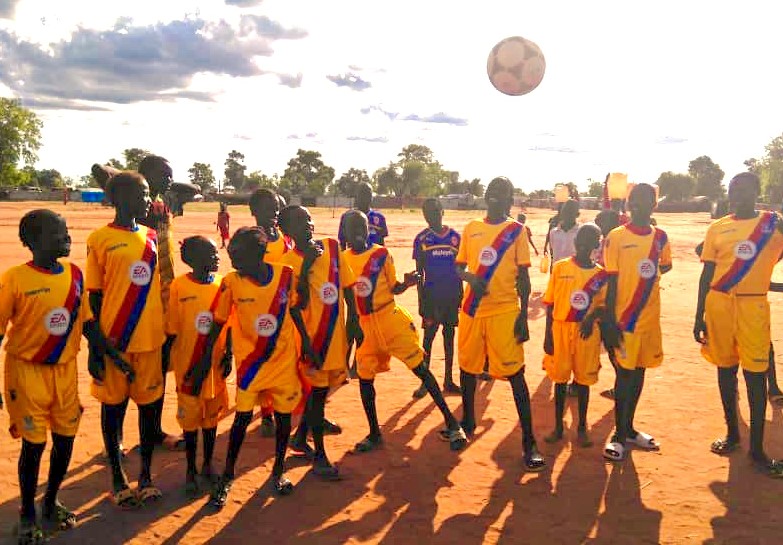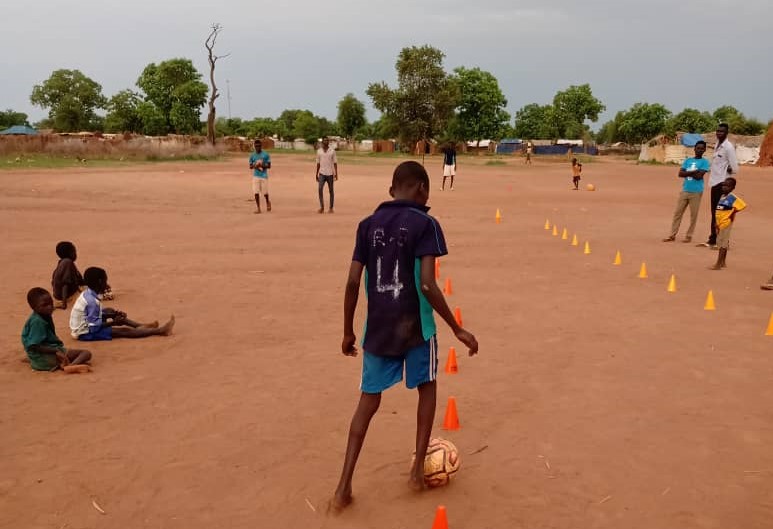From Civil War to the Olympics: Sport’s influence on the lives of refugees
Life as a refugee can be one of uncertainty, disruption, and more often than not, suffering.
However, amidst the struggle, sport provides hope and a sense of purpose for displaced people across the world.
Regardless of age, gender, race or religion, sport is enjoyed by all.
From grassroots to elite level; its reach is unrivalled.
It inspires and unites people, promoting key values that transcend both language and culture.
Opportunities to participate in sport, however, for millions of people are limited by significant social, economic and political barriers.
In response, organisations around the world are attempting to break down as many of these barriers as possible.
One example of this is Green Kordofan, a charitable organisation that supports refugees and internally displaced people in South Sudan.
Founded by Sudanese-born Raga Gibreel, the charity primarily focuses on vulnerable and war-displaced children aged 5-18.
Since 2011, civil war in the South Kordofan region of Sudan has created hundreds of thousands of refugees and displaced people, with over 70,000 of them taking refuge in Yida, South Sudan.
One of Green Kordofan’s key aims is to provide sport programmes for the young people in Yida’s refugee camps.
Led by a small number of staff and volunteers, the charity currently has over 800 children participating in training sessions, three times a week.
This includes over 30 boys and girls football teams, volleyball training and cycling lessons.
Raga, having overseen the growth of charity since its formation ten years ago, acknowledges the huge impact football in particular can have on the well-being of young people and refugees.
“I’m really convinced that football out of all sports has its own magic,” she said.
“It can help us build bridges of friendship and hopefully [provide] a respite for these children.
“The sport is very popular in the country, and we made it special by encouraging young girls to take up the sport.”

While football and all other sporting activities were put on hold due to the coronavirus pandemic, Green Kordofan continued to operate tirelessly in helping raise awareness of the disease.
As Raga explains, educating the children about important health issues is one of the charity’s main objectives.
“We noticed how quickly false health messages travel so we deliver vital hygiene messages via local radio and even megaphones to help the people there get information from accurate and recognised medical sources which are unreachable to many.”
“It’s vital to enable them to make an educated choice for their lives.”
In addition, training sessions designed to inform the children about issues such as HIV, social equality and conflict resolution are also provided.
Through the nature of these educational sessions, Green Kordofan provide a peaceful, safe and positive setting for young people to learn and have fun together.
For Raga, encouraging this type of environment is essential for the physical and mental well-being of the children.
“The organised activities have proved to help them make friendships and find support,” she explained.
“We noticed the changes in their behaviour. They are less aggressive, less stressed, more loving, it seems to distract them from their painful memories.”

The name ‘Green Kordofan’ was chosen by Raga when forming the charity at the end of 2010.
Not only does it signify the charity’s commitment to ‘promoting green shoots of recovery’ in Kordofan, it also originates from Raga’s association of the colour green with hope.
The name is both fitting and symbolic.
For refugees and displaced people across the world, sport provides a much-needed sense of belonging and reason for hope.
This remains the case not only at a grassroots stage, but also for individuals who are elite-level athletes.
Someone who understands this sentiment more than most is Olympic marathon runner Yonas Kinde.
Born and raised in Ethiopia, Yonas was forced to leave his native country because of political conflict and has lived in Luxembourg since 2012.
Despite this adversity, he continued to pursue his passion for running and quickly became the best marathon runner in the country.
“I’m crazy for running,” Yonas explained. “From a child until now. I love it.”
Reflecting on some of the biggest challenges he’s faced, Yonas – who competed as part of the inaugural Refugee Olympic Team at the 2016 Rio Games – paid particular credit to the powerful vehicle of sport.
“Sport is my family. In my whole life it has helped me to find myself, get stronger and to integrate with local people in the community.”
Yonas is one of 50 refugee athletes currently listed on the Refugee Athlete Support Programme, a scheme designed to closely monitor and help those hoping to be selected as part of the final IOC Refugee Olympic Team for Tokyo 2021.
Another athlete included on the shortlist, and vying for a final spot on the team is 100m runner Dorian Keletela.
“It’s a great pride for me to work hard to be part of the final list of athletes,” he said.
Keletela was born in the Democratic Republic of the Congo but fled to Portugal in 2016 after his parents were killed.
Reflecting on his new home in Portugal and settling into a completely different environment, he highlights the important, unifying tool of sport.
“Sport is very important in my life because it allows me to be healthy and to value myself as a person.”
“I feel safe in Portugal because there is freedom and human beings are respected.”
The poignant words of both athletes demonstrate the huge potential sport has to effect social change for refugees and displaced people worldwide.
It improves physical and mental wellbeing, as well as teaching universal values such as respect and fair play.
But perhaps more importantly, sport doesn’t just empower on an individual basis; it unites and inspires people collectively.
Green Kordofan recognise this, with the charity paying particular attention to the importance of building a culture of peace and teamwork.
“If the youth cooperate with each other and compete constructively in sports matches, then principles of peaceful cooperation will be learned,” explained Raga.
“Adhering to rules of the game, respect and fairness will contribute to democracy and a culture of peace over the dominant culture of war.”
While organisations such as Green Kordofan continue to expand and provide support, the challenges remain considerable.
According to the UNHCR’s latest annual Global Trends report, the number of refugees across the world continues to rise.
Despite this, the presence of hope remains a powerful tool, and through sport, lives can be transformed for the better.